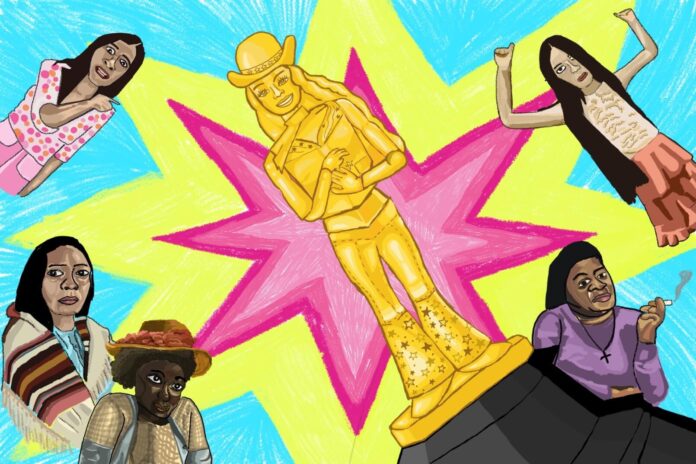Even before “Barbie” was released in July of 2023, it was going to be a cultural phenomenon. The internet had been ablaze for weeks with the “Barbenheimer” meme, and photos leaked every day of actors on set in colorful costumes. People flocked excitedly to cinemas to see it, prompting some to herald the return of the movie-going tradition. When Oscar nominations were announced on Jan. 23, it was nominated for Best Picture, alongside noteworthy contenders like “Killers of the Flower Moon,” “Oppenheimer” and “Poor Things.” And yet, as the internet quickly noticed, there were two notable omissions: Greta Gerwig for Best Director and Margot Robbie, who played “Barbie” herself, for Best Actress.
Admittedly, the optics weren’t great — Ryan Gosling, who played Ken, was nominated for Best Actor, prompting comparisons to the issues described in the film — men being over-applauded for mediocre work while women go unrecognized. “Barbie” was a cultural phenomenon, the likes of which haven’t been seen in years. But the shock and outrage at Gerwig and Robbie’s lack of nominations — the Associated Press called it “one of the biggest shocks in recent memory” — belies a deeper belief that we hold about film today. We seem to think the film which makes the biggest cultural splash by attracting the most ad revenue and media attention is necessarily the best written, the best directed, the best acted.
“Barbie” was successful in every sense of the word, and finances were no exception. It grossed more than 1.4 billion dollars worldwide, and sales of “Barbie” products increased 16% in the wake of the movie. It won a Golden Globe in the newly-created Box Office Achievement category. Beyond hard sales numbers, the movie’s production and reception was heavily commercialized. Despite the cheeky jokes about the company during the film, Mattel signed off on the production. And the femininity that “Barbie” encourages young women to embrace costs money: makeup, pink clothes and accessories, “Barbie” Halloween costumes.
This is not to say all of this is bad; “Barbie” has catapulted discussions of female equality to the mainstream and introduced feminism to a whole new generation of young girls. But it’s a mistake to think that the omnipresence of the “Barbie” movie (and “Barbie” memes, and “Barbie” laptop stickers…) and discussions about its message mean that its directing or its lead-actressing is necessarily Oscar-worthy.
Let’s turn to a director who was nominated for an Oscar this year: Justine Triet for “Anatomy of a Fall.” The nomination itself is noteworthy. Triet is the only woman nominated in a pool of five contenders. And “Anatomy” itself is deeply feminist: Triet’s main character, Sandra Voyter, is a successful female novelist. Triet refuses to let her be a brutalized victim, as female characters in mainstream movies so often are. Voyter comes under legal and personal attack mostly because of her success, intelligence, ambition and bisexuality and emerges victorious. This is a deeply feminist story and rumination on female power and motherhood. It’s just hard to sell a toy about it.
Or consider Lily Gladstone, nominated this year for Best Actress. She is the first Native American to be nominated for Best Actress, as well as being queer, a group still underrepresented in Oscar nominations and wins. But if Gladstone wanted widespread cultural recognition for this historic achievement, she made the mistake of appearing in “Killers of the Flower Moon,” which, as a film about an Indigenous woman’s family being murdered by a group of white men, takes much less well to glamorous outfits inspired by its characters than “Barbie.”
Implicitly, the reason why people have a tendency to hold Triet and Gladstone to an unequal standard is precisely this fact — performances in movies that aren’t easily commercialized do not receive the same mass-market attention that movies like “Barbie” receive. Gerwig and Robbie, as white, already-successful people, had more resources and accolades, even before the movie premiered.
It was America Ferrera, a Latina woman, who delivered the film’s iconic monologue about the brutal expectations placed on women in society. She is nominated for Best Supporting Actress, yet the attention seems to be largely on the non-nomination of Gerwig and Robbie, two white women. The stories of these “snubs” sell better than Gladstone or Ferrera’s wins. Gerwig and Robbie have found themselves the underdog main characters of a story they are really not underdogs in. Of course white, attractive, already-famous people should win an Oscar, and when they don’t they are the victims of profound unfairness. The idea that someone else might have delivered a superior performance is almost beside the point.
Finally, don’t forget that “Barbie” has hardly been snubbed. The film has two of the five nominations for Best Original Song. Its nominations for Costume Design and Production have all-female nominees. And, of course, it is nominated for Best Picture, arguably one of the most important Oscar categories and itself a substantial accomplishment for a film targeted towards women.
I make no claims about whether or not Gerwig or Robbie’s individual contributions should have netted them Oscar nominations. And sexism is certainly still an issue in the awards system; it likely contributed to Gerwig not being nominated in what is still an overwhelmingly male-dominated category. But if you really want to be a supporter of feminist film, don’t focus your attention on Gerwig and Robbie’s largely manufactured struggle. There are a lot of great actresses and female directors out there — not just the ones pushed up by Mattel.
Contact Ruby Gower at gower@oxy.edu
![]()



































